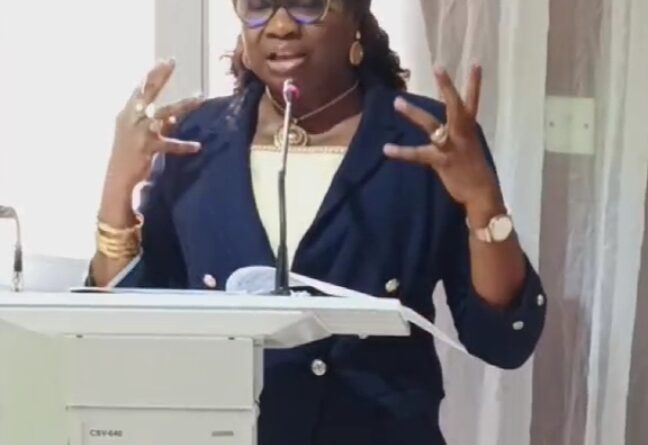Japa: You Are Better Off In Nigeria, Dabiri-Erewa, Oloyede Counsel Nigerian Youths
Stakeholders at an online platform have advised Nigerians, especially the youths travelling outside the country, to be more patriotic and travel legitimately for self and national development.
NIDCOM spokesman, Abdur-Rahman Balogun in a statement issued on Monday said this was one of the highlights of the lecture delivered by Hon. Abike Dabiri-Erewa Chairman/CEO Nigerians in Diaspora Commission (NIDCOM) on “Pros and Cons of Japa” at No Dull Moment in Islam (NDMI), an online platform for Muslim Elites and Professionals.
Dabiri-Erewa, who was the Special Guest of Honour, discussed the phenomenon of irregular migration, its negative impacts, and potential ways to mitigate its effects, with a focus on the challenges and opportunities facing Nigeria’s medical personnel and the issue of Nigerians being trafficked to Libya and other countries.
The NIDCOM boss confirmed the mass exodus of Nigerian youths under the guise of looking for better opportunities elsewhere without having the intention of returning back to the country to give back.
She said that though the country is passing through some challenges which is global and been faced by the countries where some of them are running into.
She, however, said migration is the fundamental rights of an individual but such movement must be justified and evaluated before embarking on it.
Dabiri-Erewa recalled how the Commission alongside other agencies of government have facilitated the return of over 10,000 stranded Nigerians from Libya alone, as well as from Saudi Arabia, UAE, South Africa, Lebanon, Germany among others.
She said some of them have subjected themselves to menial jobs that they cannot do in Nigeria, some lost their lives in the process while others have sold their family inheritance just because they want to migrate (Japa ).
She implored the Nigerian professionals to increase awareness and education about the negative effects of irregular migration and the importance of seeking employment within Nigeria.
On the side of the Federal Government of Nigeria, she assured that the new administration of President Bola Ahmed Tinubu will implement reforms to create more job opportunities and improve the economy, aiming to reduce the need for migration.
She reiterated the resolve of her Commission to work on strategies to prevent Nigerians from being trapped in situations like those in Libya, ensuring safe return for those who have already been affected through aggressive advocacy and partnership with relevant agencies of government.
In his contribution, Prof. Is-haq Oloyede, Registar of Joint Admissions and Matriculation Board (JAMB) who also doubles as Secretary-General Nigerian Supreme Council for Islamic Affairs (NSCIA) also explored the reasons for migration from an Islamic perspective, the need for economic advancement and knowledge transfer within their community, and the potential of harnessing the diaspora to improve the country’s economy and security.
Oloyede who shared his expriences in interaction with some Nigerians who travelled outside the country, canvassed for more collaboration with government agencies to stem the tide of irregular migration and thus reducing brain drain and encourage Nigerian diaspora to invest in Nigeria’s economy.
The JAMB Registrar expressed his willingness to work with the Minister of State for Health, who is in charge of Nigeria Medicals in the diaspora, to implement recommendations for improving the health sector in Nigeria .
Prof Is-haq Oloyede shared his recent experience of trying to import medical equipment for the use of teaching hospitals in Nigeria which attracted huge custom duties, capable of discouraging donors thus highlighted the need for a standing committee to scrutinize new equipment and ensure its authenticity.
Speaking in the same vein, Prof. Lateef Sanni, the Executive Director of the Nigerian Stored Products Research Institute (NSPRI), Ilorin, detested how some of his colleagues refused to return to Nigeria after studying abroad to apply their acquired knowledge and skills.
He argued that India, China and Singapore utilised the experiences of their returned diaspora for national development thus proposing utilising the experiences of Nigerians who have returned from abroad as advocates and taking advocacy messages to religious houses.
Participants at the webinar also discussed the potential of harnessing the diaspora to improve the country’s economy and security, while acknowledging the challenges of changing mindset and promoting their message.
The participants expressed determination to continue their efforts towards improving the situation thus urging President Bola Ahmed Tinubu’s administration to support the returnees by providing enabling environment for them to thrive.
Similarly, participants highlighted the difficulties faced by professionals trying to bring in their expertise into the country, including financial and bureaucratic hurdles which should be removed by the government as an incentive for investors in the country.
Above all, the participants emphasised the importance of patriotism and community involvement in social development, particularly through a cultural renaissance as well as advocated for a stronger social security system to assist the unemployed, and encouraged greater volunteer service to strengthen the country’s fabric.
They equally proposed to the government that the Japa team, which consists of Nigerians working abroad, could act as agents to assist their fellow citizens seeking employment overseas, thereby contributing to the country’s national development.
It was also recommended that those migrating outside the country based on frustrations about the difficulties graduates face in Nigeria, should explore legal requirements for job legitimacy.
Earlier in his welcome speech, Dr Mutiu Agboke, the Coordinator of NDMI said the platform is for Muslim Elites and Professionals across the globe championing issues of national cohesion and development through its regular online lectures where the resolutions are passed to relevant agencies for execution.




